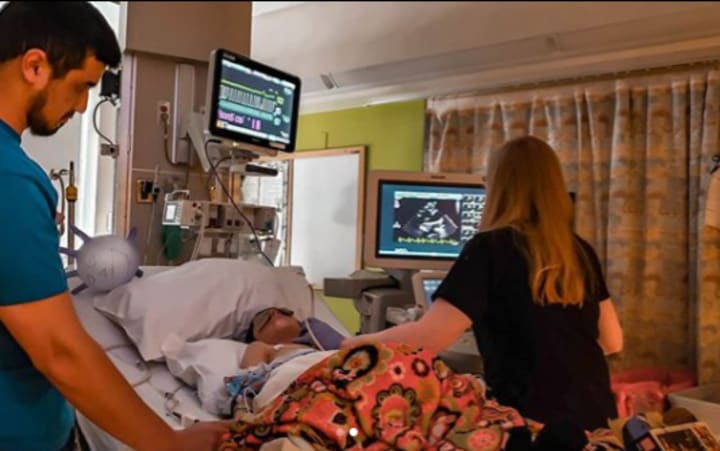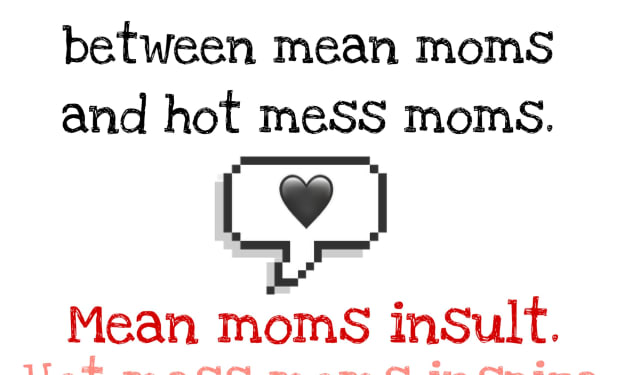Becoming a Heart Mom
Not every mom gets to be a heart mom. Here's the story of how I earned my new title.

Earlier this year, my family experienced one of the scariest moments of our lives. The series of events that occurred were things we never thought we’d have to go through, but that happen to hundreds of families across the globe. Before this experience, I was just a mom. My son was just a regular 7-year-old kid. Although I am still a mom and he is still my son, a few things have changed, and I’d be lying if I said it isn’t scary.
All of this started at the end of January. I was picking my son up from his dad’s house on a Wednesday evening, as usual. They were laying on the couch together, it was quiet. As we got ready to leave, my son sat on the stairs and took a deep breath, saying “it feels like my heart is beating really fast.” It wasn’t the first time I’d heard those words. I simply said “okay,” and told him we would keep an eye on it when we got home. His dad and I made eye contact briefly, as if sharing a moment of concern.
About a half hour after we got home, I looked over at my son who was sitting on the couch with a blanket over his lap watching a movie. He was pale and had dark circles under his eyes, which is strange for him since he has naturally dark skin. I asked if he was feeling okay and his response caused my mother anxiety to increase. “I just feel really tired.” I have a medical background, and it’s no secret that fatigue is a very common symptom of heart irregularities. When I checked his pulse, it was too fast to count, so I used my smartphone. It was 222 beats per minute. Immediately, I knew something was wrong.

After calling his doctor’s office, we were told to get to the nearest emergency room as quickly as possible. So we did. The second we got him checked in, they were ready for him. His pulse had increased to 242 beats per minute and suddenly there were at least 10 nurses, aids, and doctors in his room. He was put on oxygen and hooked up to EKG leads. They drew his blood and asked his dad and I a hundred questions. His pulse consistently stayed in the 240s, even after they tried a few vagal maneuvers. The next step was pushing an anti-arrhythmic medication through his IV. Three doses later with no success led the doctor to more cautious measures that required a call to the pediatric cardiologist at our state’s number one children’s hospital.
The last possible treatment that could be done in the ER was cardioversion, or an electrical shock to the heart to convert it back to a normal rhythm. As a mother, I was absolutely terrified but I knew I had to smile and tell my son everything was going to be just fine. When his dad and I were instructed to leave the room, the nurses put him to sleep and shocked his heart while I fell into a puddle of tears. It wasn’t until we came back that we learned it was attempted three times with no success. The next step was an ambulance ride to that number one children’s hospital, Doernbecher.
I rode in the ambulance. With my 7-year-old son. While his heart continued to race.

Upon arrival, he was admitted and hooked back up to machines. They nurses started two IVs for adequate access. And then we waited…
SVT. Heard of it? It stands for supraventricular tachycardia, a type of heart arrhythmia that occurs above the ventricles in the atria. There are several types of SVT, including atrial tachycardia and sinus tachycardia. It also includes a rarer type of SVT called Wolff-Parkinson-White syndrome, or WPW SVT. In WPW syndrome, an extra electrical pathway between the upper and lower chambers of the heart causes a rapid heartbeat. The condition is present at birth. My son’s cardiac team was quite surprised that he presented with such severe symptoms at his young age, since this condition can often go undetected.
After eight hours of a pulse that never dipped below 220, the doctors and nurses finally brought in a loading dose of a medication to convert his heart. Just before administration, my son’s heart converted itself back into sinus rhythm, and his pulse was beating steadily at 142 beats per minute. Everyone was shocked, even the cardiologists.

All I could think about was my son’s resilience, how much stronger he was than me, how much more brave he was. It was in that moment that I felt truly inspired to be better, to do better. Not just as a mother, but as an individual. How is it that, as he was hooked up to machines and multiple IVs, that he could smile and giggle and still make me laugh when I felt like my world was falling apart? How could he gather the strength to take goofy pictures with me when he barely touched his food. How is it that this sweet child of mine could calm my racing, aching heart while his is struggling to remain in sinus rhythm? To this day, I don’t know how he did it, but he did.
From there, he was started on a medication called Flecainide to slow his heart rate and help him remain in sinus rhythm. We had to remain at the hospital until he was symptom free for 48 hours after the first dose of medication. As if things weren’t bad enough, he was diagnosed with Influenza B while admitted and the doctors discovered not one, but two heart defects while reviewing his echocardiogram.

So, not only was he diagnosed with WPW, but he also has a structural abnormality with his coronary arteries leading into the heart’s ventricles incorrectly. His cardiologists were not as concerned with this defect but will keep an eye on it as he ages. My son will now have a cardiac team for the rest of his life to manage his Wolff-Parkinson-White syndrome as well as monitoring his arteries. He will have a procedure done around age 11 or 12, depending on his size, called ablation, where thin catheters with electrodes on the ends are threaded through blood vessels to the heart to destroy the extra pathway. This procedure is a permanent correction and minimally invasive, all things considered. Until then, he will remain on Flecainide, three times a day and have regular checkups.
Since his diagnosis, we have had a few more scares. His heart rate has jumped up, close to 200 beats per minute, even with medication. His dose has been increased, and the cardiac team has discussed a second echocardiogram to check on his arteries and the overall condition of his heart. His whole team is hopeful and recognizes the strength my son carries in his heart and soul. And so does this family.
Never in my life did I think one of my babies would end up having a congenital heart defect. It started with him simply saying, “it feels like my heart is beating really fast.” The doctors tell you over and over, as a mother, that you did nothing wrong, that your pregnancy is not to blame. But it feels impossible to believe the words. As a medical professional, I know it’s the truth, but as a mother, I’m second guessing every decision I made while carrying this little boy. But, as I tell myself each night as I watch him sleep peacefully, tomorrow is a new day, possibly with new challenges to overcome. This sweet angel is incredibly strong, and his dad and I couldn’t be more proud. We are so thankful for the amazing team of cardiologists that cared for our son, and continue to provide care for him.

Children are amazing. He has taught me so much, and I continue to feel blessed to be his mother. As a friend of mine once said, “not just any mom gets to be a heart mom.” I take that role very seriously, and always will.
About the Creator
Ashley Beatty-Pernetti
Wife. Mom. Creator.
Just a messy 29-year-old, wading her way through life, one word at a time.
Raising mental health awareness with the written word and firsthand experience.
Both fiction and non-fiction stories to nourish your soul.






Comments
There are no comments for this story
Be the first to respond and start the conversation.